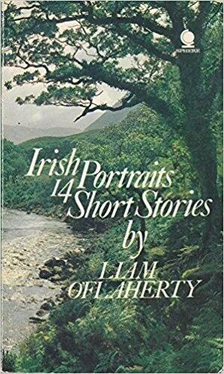Mary and Michael followed him out of the yard, and as they were shutting the door Mary whispered to Michael: “Don’t let him go.” Michael looked at her and smiled. The jobber paused half-way down the yard and turned about.
“I’m telling ye, Michael Derrane,” he said, “you’ll be sorry to turn down my offer. There isn’t another jobber in the county will give ye within one pound of the money a week from today. And yer pigs show no signs that they are going to improve.”
“There is nothing in that but fool’s talk,” Michael called out. “Why not be a man and give the sixteen pounds?”
The jobber walked back hurriedly. He spat on his right hand and held it out to Michael
“Are you going to break a gentleman’s word?” he said loudly. “Say fifteen pounds -”
Michael turned away from the outstretched hand and shook his head. The jobber waved his stick and turned to Mary.
“My good woman,” he said, “I have done my best, what more can I do? Although I would hate to think I would leave your mother’s daughter’s house without buying them.”
“Oh, wait now,” said Mary, smiling coquettishly, “sure, as the men can’t arrange the bargain, maybe a woman could step in and settle the difference. Don’t go back on a woman’s word and split the difference.”
“Spoken like a woman,” cried the jobber, stamping on the ground with his foot. “I was never a man to go against a word from the lips of a beautiful woman. Split it is as far as I am concerned. Are you satisfied, Michael?”
“Put it there,” cried Michael, holding out his hand.
“The bargain is made. Fifteen pound ten it is.”
The three of them went into the pigsty again and the jobber put his mark on the pigs’ backs with his scissors. Then he hurried away waving his stick, glad he had got the pigs for ten shillings less than he had intended to give. Michael and Mary entered the cabin.
“Oh, Michael,” said Mary, “now we can go to town on Thursday and I’ll get everything we want and we’ll have a great time, won’t we? Now what’s the matter, Michael? What is it you’re thinking about?”
Michael was looking at the ground with his hands behind his back. He was scowling at the floor.
“It’s nothing,” he said, shrugging his shoulders. “I was wondering whether Peter Mullen would have given another ten shillings if I had held out a little longer. I’d hate to have it said that he bested me. But, sure, the ten shillings won’t matter, Mary. Give me ten kisses instead.”
Eight bells tolled slowly in the engine room. He marched down the iron ladder into the stokehold. The others marched rapidly in front of him, their light-shod feet pattering, their covered left hands rushing along the hot rails with a slipping sound. His feet stumbled heavily down. His hand trembled on the rail.
He was sick. He should be in bed. But he had been a fireman for twelve years without missing a watch. His pride said: “Die before your fires rather than let a fellow-worker shed his body’s sweat for you.”
When he landed in the stokehold the hot fumes struck him in the chest. He gasped, caught his eyes with his fists and staggered. His stomach muscles contracted. They crowded around him in pity, urging him to go back to his bunk. He straightened himself fiercely and thrust them away with a swinging movement of his arms. “I’d die sooner than that,” he growled.
He marched to the fires. His thin outward-curving calves were visible passing the bright glow from the ashpits of the furnaces. His tall, slim body and his bony head were hidden in the gloom.
The retiring watch went up the ladder to the deck. Their faces were black. Their eyes were white. Their sodden trousers clung to their sweating thighs. They went up the ladder groaning curses on the sea, the fires, God, and the rich men who make slaves toil in the bowels of ships.
It was very dark. Ashes and coal-dust floated in a thick mass through the sluggish air. The electric lights glimmered like dim candles. The bulky forms of the boilers loomed out of the darkness. The engines thudded. A dull volcanic murmur came from the hidden fires.
He stripped before his fires and put his sweat-rag in his belt. Then he seized the long swaying rake to clean his low fire. He opened his furnace door. His body flashed into the firelight. He was naked to the waist. The ribs rose in ridges on his fleshless breast. The skin lay taut along his protruding jaws. His eye sockets were black. His biceps were rugged knots interlaced with sickly blue veins.
He stooped forward and thrust in the rake. A wave of heat emerged, striking him in the face. He reeled before it for a moment. Then he made a great effort and stood erect. A cold sweat poured out all over his body. That terrified him. Had the others seen? He looked cautiously. They were working furiously. They had not seen. Good.
He swore a blasphemous oath and muttered to himself: “I am not going to give in.” He hauled out the red-hot ashes and the jagged cakes of spent coal that clung like glue to the fire-bars. He finished one side. He changed over the live coals from the other side. He cleaned the other side. All finished. He handed the shovel to the trimmer to coal the bars. Then he walked stiffly to the ventilator.
God! Not a breath of wind came down the dusty gaping tube from the sun-baked deck. His lungs strained like inflated bladders to catch the hot air that struggled down his parched throat slowly.
And there was a great inward heaving of his sides like the panting of a tired horse.
His whole body murmured: “Water, water, water.” But his fierce mind would not listen to the cry. He must feed the fires.
Suddenly his head seemed to swirl round and round. Madness seized him. He wrinkled up his mouth and nose. Then he laughed harshly. Rasping sounds filled the stokehold, furnace doors opening, shovels grating along the iron deck, black coal being shot in among the licking flames. It was the madness of conflict. His weakness vanished. He dashed at his shovel, seized it, spat and opened the door of his right-hand fire. “Give it to her, boys,” yelled the potbellied engineer, as he rushed into the stokehold, “Steam is falling. Steam is falling. Give her a shake.”
The great fires roared and shot out whirling shafts of yellow flame to meet each shovelful of black coal that was hurled into them. He talked wildly to the fires as he hurled in the coal. He called them foul names and put out his tongue at them. He glared at them and hurled himself at them savagely. They had been his enemies for twelve years. He piled coal on them, more, more, until he smothered them under a black glistening mound. Their vast roar was submerged beneath the already reddening black mound. Then he dropped his shovel again and stepped away.
Ha! There was strength in him still.
But what was this? He could not hear. Not a sound. And everything was dim. Somebody was standing in front of him making a noise. He gripped his eyes and peered. He saw a mouth wide open and moving, spitting black coal-dust from its blood-red tongue as it spoke. That was the bloody Irishman from the starboard boiler. Telling him he looked like a corpse and should go on deck. By the slippery heels of the bald-headed Chilian deck-swabber! He ground his teeth and mustered all his strength. “Leave me alone,” he yelled. “I’m a Glasgow fireman and I never give in. And I NEVER will. Leave me alone.”
His voice ended in a shriek.
He groped for the slice. His hands clawed at it blindly, for he could see nothing in the gloom. The long thick iron bar swung towards him as he pulled at it. It pushed against his shoulder and he staggered back three paces. “Steady on,” he muttered. He crouched and raised it, trembling all over. Then he groped to the fires. He opened the door and thrust the wedge-shaped point of the slice at the base of the mound. He ran it along the bars to the very end. Then he drew himself together. He must lift that mound and break it in the middle, in order to give air to the flames. He jumped with a loud gasp and landed crosswise, face downwards, on the slice, his two hands clenching the slice against his hollowed stomach. He almost lost consciousness. A terrific pain ran from his stomach to his head, making all his body numb. But his brain still thought of the fire and the mound that must be broken. It was not broken. The slice had not left the bars. It had merely bent slightly downwards from the middle to the end, under the impact of his body. His feet reached for the deck. He stood erect. He moved backwards two paces slowly, crouching low, all his sinews rigid, his eyeballs protruding.
Читать дальше












